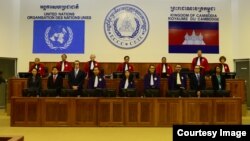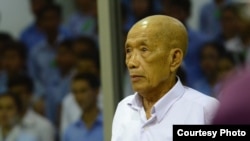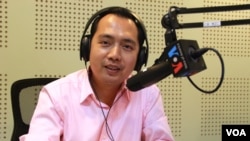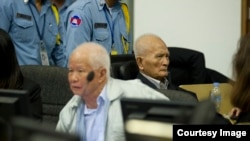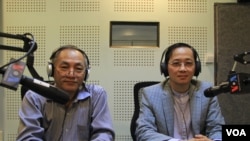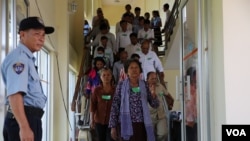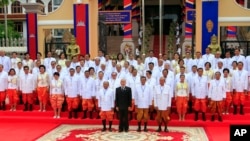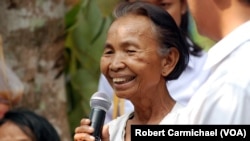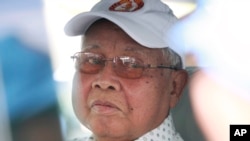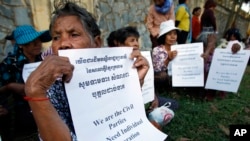Almost a decade has passed since the Khmer Rouge tribunal – also known as the Extraordinary Chambers in the Courts of Cambodia – saw an army of judges sanctioned by the country’s top judicial body and the United Nations taking their oaths outside Phnom Penh’s Silver Pagoda.
In early July 2006, the controversial tribunal finally got off the ground and was set to begin its mission of seeking justice for some 1.7 million Cambodians who died under the Khmer Rouge’s Democratic Kampuchea regime.
It was a long-awaited event, on the cards since a 1997 request to U.N. Secretary General Kofi Annan was made by Cambodia’s rulers, Prince Norodom Ranariddh and Hun Sen, then co-prime ministers.
The court’s journey since then has been marred by internal conflicts and, according to some, external interference. So far, five senior regime figures have been tried: Kaing Guek Eav, also known as Duch, who ran the infamous S-21 security center; Nuon Chea, the regime’s second-in-command; Ieng Sary, its foreign minister; Ieng Thirith, social affairs minister; and chief-of-state Khieu Samphan.
According to official figures, some $260 million has been spent on the proceedings since 2006, with only one defendant, Duch, receiving a full sentence for his charges of crimes against humanity. Ieng Thirith was excused from her trial, suffering from Alzheimer’s disease and later died, following her husband Ieng Sary.
Both Nuon Chea and Khieu Samphan, now well into their 80s, face life sentences if found guilty on charges of crimes against humanity and genocide in the ongoing Case 002.
Despite criticism leveled at the court, a spokesman for the ECCC, said it had overcome numerous obstacles to seek justice for the Cambodian people and, more widely, for humanity as a whole.
“It gives a chance to the victims to get justice and mental reparations and relief when many of the stories have been exposed and heard to the whole world,” he said.
The complexity of the numerous languages and legal systems used by the tribunal and the gravity of the charges had led to slow but steady progress, he admitted.
“Prosecuting cases of crimes against humanity, war crimes, and genocide like this, it demands time to conduct accurate investigations that leads to the discovery of truths,” he said.
“For the ECCC, we have millions of victims and millions of pages of documents to work on,” he added. “We understand that our compatriots want justice by using a short period of time, but we also need to abide by the legal procedures.”
Despite arguing that the court could have done more, faster, prominent human rights lawyer Sok Sam Oeun, who has followed the proceedings closely, said the court deserved praise.
“The tribunal sets a clear message to all dictators that they will meet a punitive end,” he said.
Sok Sam Oeun praised the court for having stuck to its governing principles in the first two cases against Duch, Chea, and Samphan.
“It doesn’t mean the winner is prosecuting the loser,” said Council of Ministers spokesman Phay Siphan. “It sets an international standard of justice – for the first time we are prosecuting war criminals where the action took place.”
It also set a precedent in terms of local judicial reform as the country had to establish an affiliated administration body that met international standards to liaise with the court, Siphan claimed, calling the tribunal an “inheritance for the whole nation and the world.”
A lack of funds has plagued the court almost from the outset. In 2013, about 130 local tribunal staff members went on strike over delayed salary payments. The United Nations settled the problem later that year, offering more than $1.8m in compensation.
Sophal Ear, author of Aid Dependence in Cambodia: How Foreign Assistance Undermines Democracy, said the court had been fundamentally flawed from the beginning because it adopted the hybrid system.
“This was a recipe for disaster. But we have what we have and from that original sin comes all the problems like two people driving one car at the same time,” he said.
Ear argued that the lofty dream of the ECCC providing a model for judicial reform in Cambodia had not come to pass.
“It was the Cambodians who schooled the West on how to properly capture a mixed tribunal and neutralize if not completely isolate it from relevance. There is little hope the Cambodian judiciary will be penetrated as a result of this,” he said.
Complaining of political interference, critics have blamed the rift between the local and international sections of the tribunal for its ups and downs, and has in recent years focused on the ability of the court to expand its scope past Case 002.
In 2009, a French co-investigating judge called senior members of the ruling Cambodian People’s Party to testify, including the party’s late president Chea Sim, National Assembly President Heng Samrin, former Foreign Minister Hor Namhong and Keat Chhon, a former finance minister, none of whom chose to appear before the court.
A year later Prime Minister Hun Sen expressed his disapproval of the notion that the court’s remit extended beyond Case 002, citing the threat of civil war.
The controversy intensified in 2011 when Nuon Chea’s then-co-defense lawyers – Michiel Pestman and Andy Ianuzzi – lodged a complaint to a local court against Hun Sen and 10 other CPP leaders over their “criminal interference” into the tribunal’s affairs.
But the cases against the CPP’s top brass have never been heard in the local court, and Hun Sen has continued to warn against the hybrid tribunal investigating more suspects.
The international side of the court, however, has defied such warnings on occasion, naming regional Khmer Rouge leaders such as Meas Muth, Yim Tith, Ao An and Im Chaem as suspects in Case 003 and Case 004.
Government spokesman Siphan claimed that the main concern of the court pursuing further prosecutions was “bankruptcy” as financial shortfalls persist.
“It’s just our idea because we cannot interfere into the tribunal’s affairs to decide. We leave it for the tribunal … to decide. But the Royal Government [of Cambodia] has raised this view of ours for the consideration of all,” he said. “If they make any decision, the Royal Government has no power to oppose them besides – as judicial police – executing their orders.”
In a recent interview with VOA Khmer, David P. Chandler, one of the foremost historians on Cambodia, said the CPP government and Prime Minister Hun Sen himself never wanted to let the court shed light on his comrades.
“[T]his is where Hun Sen put his foot down and said, ‘No more trials’ because, for one thing, the next bunch down were in touch with a lot of the people, like Chea Sim, the top surviving ones who got off…. [Hun Sen] didn’t want the possibility of light shining on those other people,” Chandler said.
“But that would have been interesting, but it didn’t happen, so I think what we got is OK,” he added.
Sim died in June last year and the outspoken international rights group Human Rights Watch then issued a statement describing the late CPP president’s passing as the “failings of the Khmer Rouge Court.”
Chandler, however, said the court had done much to mitigate the horrors inflicted on Cambodians by their fellow countrymen.
“[T]here is an enormous amount of documentary materials about the Khmer Rouge period, which would not have been available to ordinary scholars,” he said. “It’s got oral material that has expanded the whole documentary evidence about the Khmer Rouge.”
Pestman, the former co-defense lawyer for Chea, said the tribunal was still “going strong,” but said he did not think it would achieve much in the end.
“No truth was found which wasn’t already discovered. It was a slow regurgitation of work already undertaken by other organizations, which did a much better job,” he said in an e-mail.
“In a way, the court made it worse, as the whole process was so tainted by corruption and political interference, that it could eventually even undermine the truth, instead of strengthening it,” he added.
Lawyer Sam Oeun, however, said the court would be taking a risk in leaving a negative legacy if it expanded its work beyond the Case 002.
“If the court cannot go through with Case 003 and Case 004, its mission may face derailment,” he said.
Duch lost an appeal at the tribunal’s Supreme Court, and is now serving a life sentence. Chea and Samphan are struggling in both of their appeals over the Case 002/01 life sentence and the Case 002/02 trial. Pheaktra, the tribunal spokesman, said Case 002 may be concluded in 2019.
“What we expect is to complete our mission to seek justice and truth for the Cambodian people, and the tribunal hopes that, through support from the public, the international community, the U.N., and the Royal Government of Cambodia, we will achieve the expectation,” he said.
However, Sophal Ear, who is also an associate professor at the Los Angeles-based Occidental College, said the court would also be remembered for its “ineffectiveness and how the Cambodian authorities ran circles around the internationals, outmaneuvering them [at] every turn.”
“Thankfully, Cambodians are mostly Buddhist, so they believe in Karmic Justice and the Great Wheel of Life. What goes around comes around. They know justice is not only in the courtroom; it happens in the afterlife.”




